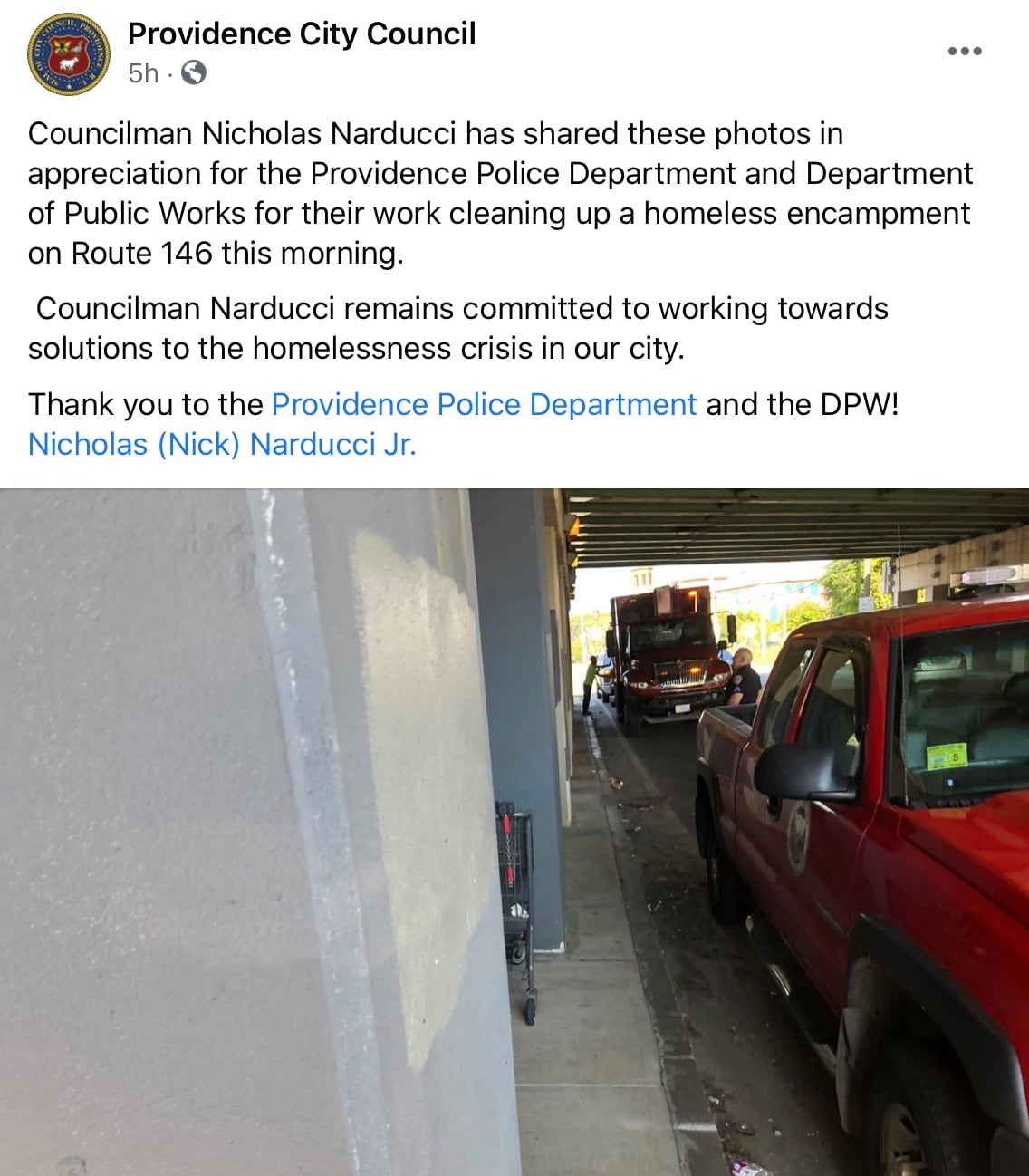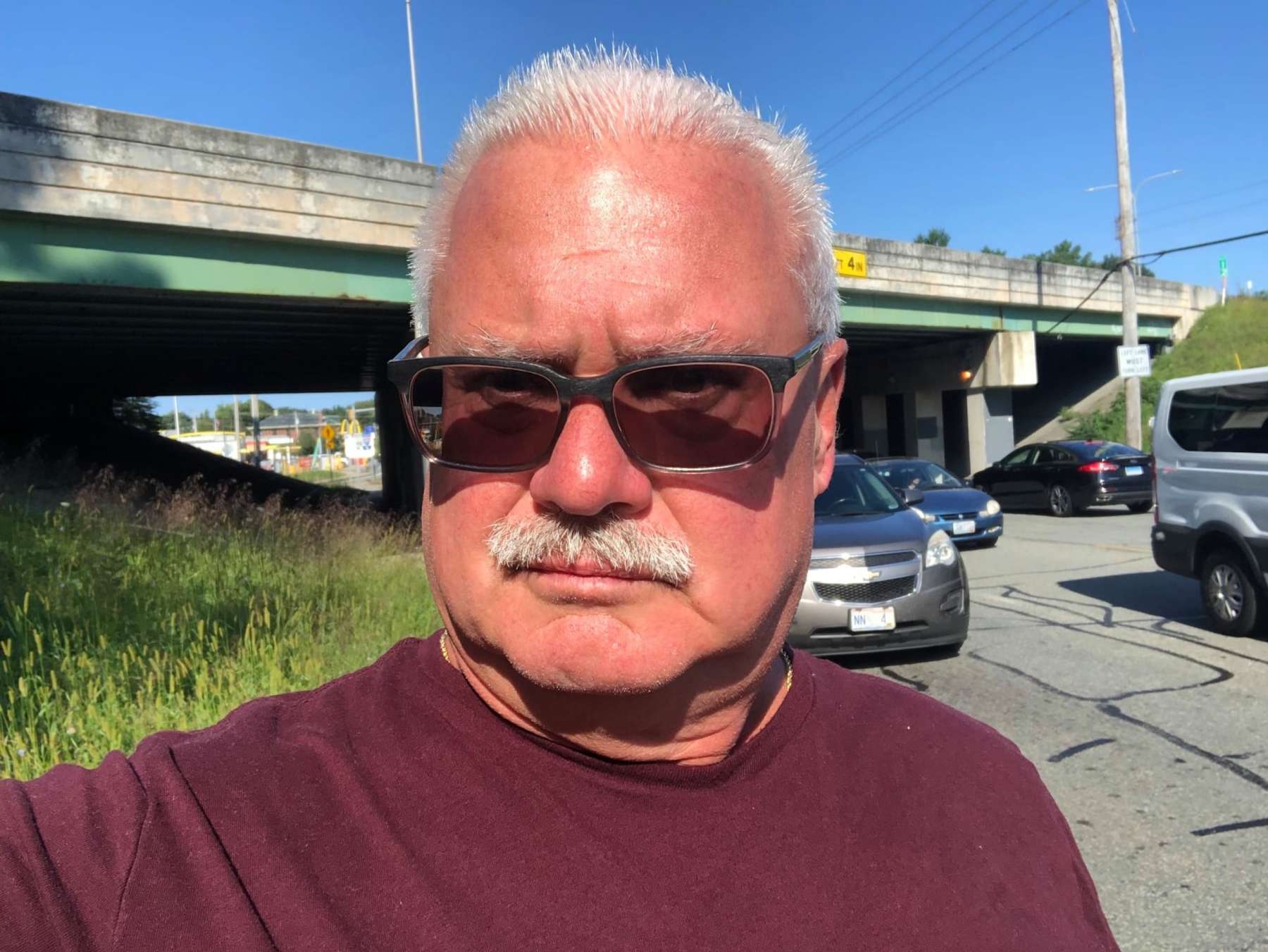Providence destroys homeless encampment – and people’s lives
“It completely sets back the work of social service providers like ourselves. It takes months, many times, to build rapport and engage with people,” said Laura Jaworski, Executive Director of the House of House CDC. “And when those camps get broken up and moved on, not only does it completely sever our relationships with people many times, but the people themselves – the human beings that are affected – have their stuff completely destroyed. It puts them back at square one and keeps them totally suppressed and marginalized and down.”
September 14, 2021, 5:03 pm
By Steve Ahlquist
Providence City Councilmember Nicholas Narducci Jr (Ward 4) took to Facebook around noon on Tuesday to proudly advertise his involvement in and support for a homeless encampment clean-up on Branch Avenue in Providence, under the Route 146 overpass. Councilmember Narducci, using the Providence City Council Facebook page, posted four pictures from the scene, including a selfie, and wrote that he “remains committed to working towards solutions to the homelessness crisis in the city.”
The councilmember post drew immediate criticisms from Providence residents and advocates who do outreach among the unhoused.
A protest has been scheduled for Wednesday, September 15th, at noon, on Branch Avenue under the 146 overpass.
Given that Councilmember Narducii credits the efforts of the Providence Department of Public Works and the Providence Police Department in doing the cleanup, Uprise RI reached out to Providence Mayor Jorge Elorza and Providence Public Safety Commissioner Steven Paré. Neither has responded to a request for comment.
Uprise RI reached out to Laura Jaworski, Executive Director of the House of House CDC. House of Hope is not the only organization providing outreach to unhoused people in Rhode Island, but outreach is their primary mission.
Jaworski: The challenge right now is that people are creating spaces that feel the most safe for them, but the system is completely overtaxed, and while the system – law enforcement or the city or what have you – feel that it’s in the best interest to do a cleanup, it’s a short-term solution that has long-term repercussions.
It completely sets back the work of social service providers like ourselves. It takes months, many times, to build rapport and engage with people. And when those camps get broken up and moved on, not only does it completely sever our relationships with people many times, but the people themselves – the human beings that are affected – have their stuff completely destroyed. It puts them back at square one and keeps them totally suppressed and marginalized and down.
When we’re contacted about encampments that are going to be broken up or cleaned up or whatever the choice of words may be, we often ask, ‘What are the solutions you would like us to propose?’
We have no more tools left in our toolbox. It is empty, and the system can’t respond quickly enough in the way that people need it, particularly when someone has been given 24, 48, 72 hours notice that their encampment – the space that they’ve set up that is most safe for them – is going to be destroyed, we have nothing to offer people. And the system is so overtaxed it cannot offer anything in return.
UpriseRI: Have you been in contact with the people in that encampment?
Jaworski: We are in contact with multiple encampments throughout the state and absolutely folks that are in that, and other encampments.
UpriseRI: What happens to them now? Where do they go?
Jaworski: That’s a great question.
In the past, when presented with that scenario, that an encampment was going to be cleaned up, we’d try our best to let people know what is coming and try to work as partners and create options. But as we’ve seen in other locations, when an encampment has been broken up and items have been disposed, people get driven underground, and we lose track of them. We don’t know where people are going to go. We can guess, based on what we know, that people will likely create other encampments and other spaces. So it all just continues to perpetuate.
So to my point earlier, it feels great. There’s a short term win of like, Hey, look at us, we cleaned up this ‘dangerous’ or ‘harmful’ or ‘unsafe’ environment, but really what we’ve done is completely uproot somebody, disregarded them as human, and thrown their belongings away. And the cycle just continues.
Then we, as the homeless service provider doing street-based outreach, working with these folks, we are then back to square one. You get back to the beginning and you’re left with nothing. That’s true for the folks that are unhoused and it’s true for my outreach team who now have to spend their time, not only tracking people down, but building trust again – trust that already hangs by a most delicate threads.









